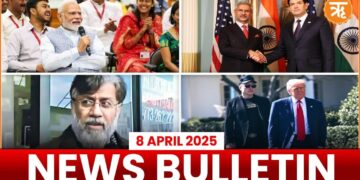India sought to downplay US Ambassador Eric Garcetti’s criticisms of PM Narendra Modi’s visit to Russia and the country’s policy of strategic autonomy, noting that the extensive partnership between New Delhi and Washington permits both nations to agree to disagree. The remarks came in response to Garcetti’s comments made last week, warning India against taking the US-India ties “for granted” and maintaining that there is no such thing as “strategic autonomy in times of conflict”.
Strongly defending New Delhi’s policy of strategic autonomy, the Spokesperson for the Ministry of External Affairs, Randhir Jaiswal said that the comprehensive global strategic partnership between India and the US provides both parties the liberty to approach certain matters differently. Jaiswal added, “India, much like numerous other nations, places great importance on its strategic independence. While the US ambassador is certainly entitled to his viewpoint, we too hold our distinct perspectives.” Byte Video1: FULL Spokesperson for the Ministry of External Affairs, Randhir Jaiswal
It is to be noted here that the US failed to take note of India’s direct appeal to the Russian President to end the Ukrainian war during PM Modi’s meeting with Russian President Vladimir Putin in Russia. India’s stance on the war was clearly conveyed by PM Modi that no solution could be achieved in the battleground, urging both, Russia and Ukraine, to choose the path of dialogue and diplomacy to put an end to waging war.
BYTE: 1.15 to 1.50 Narendra Modi, Prime Minister
Notably, several key members of the US administration expressed their concerns over the India-Russia relationship and the timing of Modi’s visit to Russia, which coincided with a summit of leaders of the North Atlantic Treaty Organization (NATO) in Washington to express support for Ukraine. US National Security Adviser Jake Sullivan had cautioned New Delhi that a “bet on Russia as a long-term, reliable partner is not a good bet” and outlined that Moscow would side with Beijing over New Delhi in case of a conflict.
















Comments